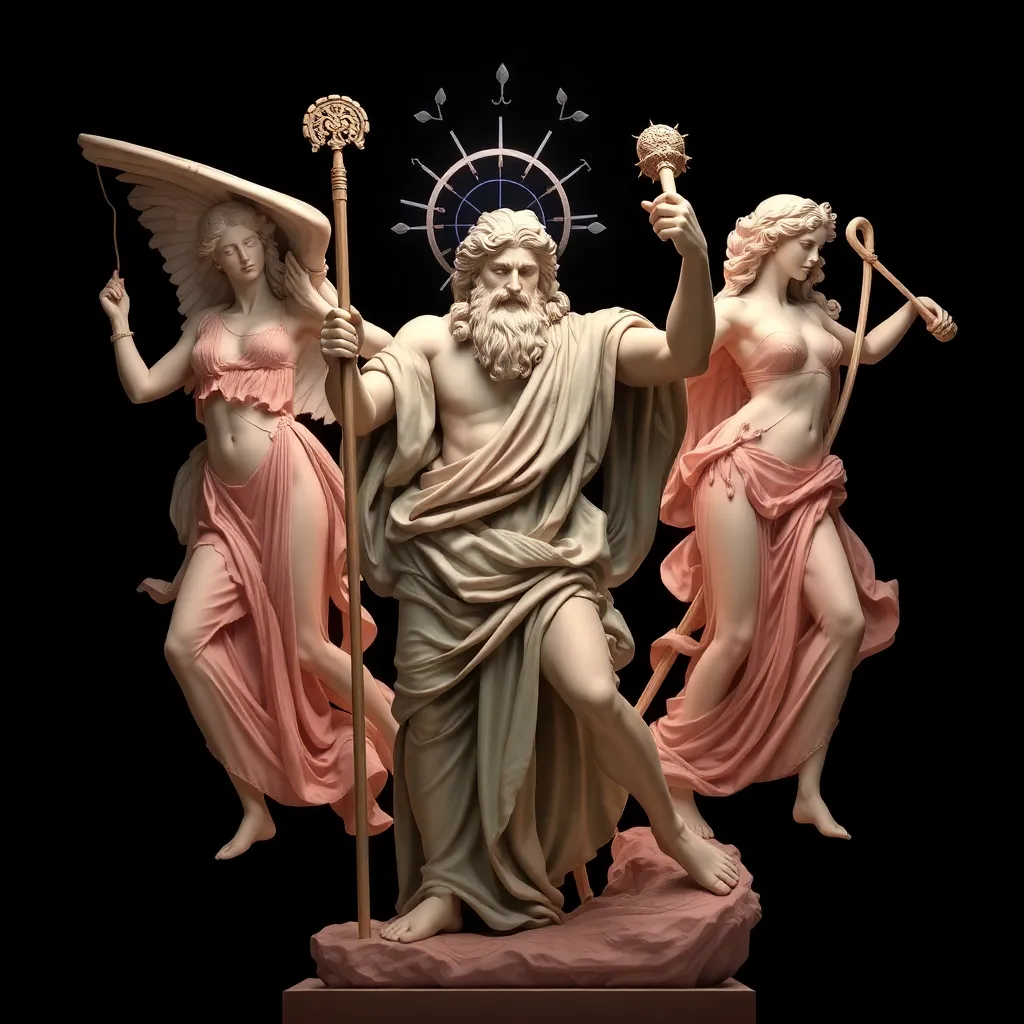The Role of Hermes in the Myths of the Muses: Inspiration and Creativity
Introduction
In the rich tapestry of Greek mythology, Hermes and the Muses occupy pivotal roles that intertwine inspiration and creativity. Hermes, the cunning messenger god, is renowned for his swiftness and ability to traverse the boundaries between the mortal and divine realms. The Muses, nine goddesses of inspiration, preside over various domains of the arts and sciences, embodying the spirit of creativity that fueled ancient Greek culture. Together, they symbolize the profound connection between divine inspiration and human creativity, a relationship that has persisted through the ages.
Hermes: The Messenger God
Hermes, the son of Zeus and the nymph Maia, is a multifaceted deity known for his numerous attributes and roles in Greek mythology. He is often depicted as a youthful figure wearing a winged helmet and sandals, carrying a caduceus, a staff entwined with serpents. His primary roles include:
- Messenger of the Gods: Hermes conveys messages between the gods and humanity, facilitating communication between the divine and mortal realms.
- Guide of Souls: He serves as a psychopomp, guiding souls to the afterlife, ensuring their safe passage to the Underworld.
- God of Commerce and Thieves: Hermes is also associated with trade, commerce, and cunning, embodying the spirit of negotiation and cleverness.
His significance as a guide and messenger not only enhances his role within myths but also establishes him as a bridge between different realms, making him essential in the narrative fabric of Greek mythology.
The Muses: Goddesses of Inspiration
The Muses are nine goddesses who inspire creativity across various fields, including music, poetry, and the arts. Each Muse governs a specific domain:
- Calliope: Muse of epic poetry
- Clio: Muse of history
- Erato: Muse of love poetry
- Euterpe: Muse of music
- Melpomene: Muse of tragedy
- Polyhymnia: Muse of sacred poetry
- Terpsichore: Muse of dance
- Thalia: Muse of comedy
- Urania: Muse of astronomy
The cultural impact of the Muses is profound, as they have inspired countless works of art, literature, and scientific inquiry throughout history. Their presence in Greek culture signifies the importance of creativity and the divine spark that ignites artistic expression.
Hermes and the Muses: A Symbiotic Relationship
The relationship between Hermes and the Muses is characterized by mutual support and collaboration. As a messenger and guide, Hermes plays a crucial role in facilitating the Muses’ inspiration. Several instances in mythology illustrate this symbiotic relationship:
- In one myth, Hermes is said to have assisted the Muses in composing the “Hymn to Hermes,” celebrating his own birth and attributes.
- Another tale describes Hermes helping poets find their voices, guiding them to the Muses for the inspiration needed to create.
These interactions highlight the interconnectedness of their roles, emphasizing the idea that creativity often requires both divine inspiration and the assistance of a guiding force.
Hermes as a Symbol of Creativity
Hermes embodies creativity not only through his interactions with the Muses but also through his inherent traits. His cleverness, adaptability, and resourcefulness are qualities that resonate with the very nature of artistic expression. Analyzing Hermes’ influence on creativity reveals several key aspects:
- Innovation: Hermes is often portrayed as a trickster, embodying the spirit of innovation and pushing boundaries in both thought and art.
- Communication: As the messenger, he underscores the importance of communication in the creative process, facilitating the exchange of ideas.
- Embracing Duality: Hermes represents the duality of life—light and darkness, divine and mortal—reflecting the complexities of the creative journey.
Through these traits, Hermes serves as a powerful symbol of creativity, inspiring artists and thinkers to explore new horizons and express themselves authentically.
Mythological Stories Involving Hermes and the Muses
Several key myths illustrate the connection between Hermes and the Muses, shedding light on their relationship and the lessons imparted through their stories:
- The Birth of Hermes: As a newborn, Hermes steals Apollo’s cattle and invents the lyre, showcasing his creative ingenuity and setting the stage for his relationship with the Muses.
- Hermes and the Muses’ Contest: In a contest of creativity, Hermes challenges the Muses, leading to a celebration of artistic expression and the acknowledgment of their divine gifts.
These myths impart valuable lessons about the nature of inspiration and creativity, emphasizing the importance of collaboration, innovation, and the pursuit of artistic excellence.
Cultural Legacy of Hermes and the Muses
The relationship between Hermes and the Muses has left a lasting cultural legacy that extends beyond ancient Greece. Their influence can be seen in various artistic movements throughout history:
- Renaissance Art: The revival of classical themes during the Renaissance drew heavily on the ideals of creativity and inspiration embodied by Hermes and the Muses.
- Romanticism: This movement celebrated individual creativity and artistic expression, reflecting the Muses’ importance in inspiring personal and emotional artistry.
- Modern Interpretations: Contemporary artists continue to draw inspiration from the archetypes of Hermes and the Muses, exploring themes of creativity, communication, and the duality of existence.
Today, Hermes and the Muses remain relevant symbols of the creative process, inspiring artists, writers, and thinkers to seek out inspiration and embrace their unique voices.
Conclusion
In conclusion, Hermes’ importance in the context of the Muses is profound and multifaceted. As a messenger, guide, and symbol of creativity, Hermes plays a vital role in facilitating inspiration and artistic expression. The enduring relevance of their relationship serves as a reminder of the necessity of inspiration in the creative process and the power of collaboration between the divine and mortal realms. In modern creative practices, the legacy of Hermes and the Muses continues to inspire individuals to pursue their artistic passions and explore the depths of human creativity.




